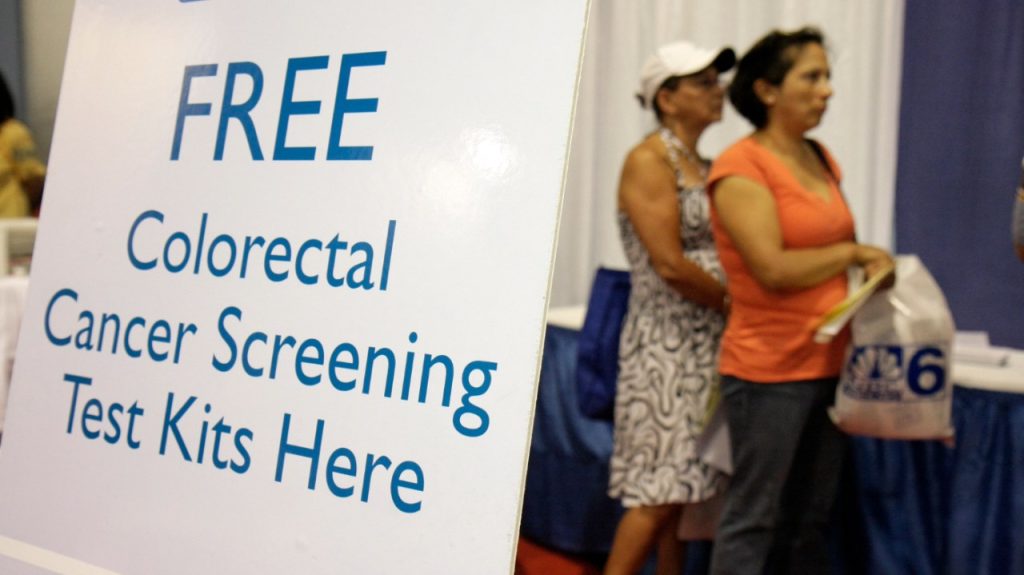A sign advertising free colon cancer testing kits is on display at the Health & Fitness Expo.
A new blood test for colon cancer that aims to detect the disease early so it can be treated was approved by the Food and Drug Administration (FDA) on Monday.
The blood test, called Shield, is made by Guardant Health and has been on the market since 2022, but it hasn’t been widely covered by private insurance, meaning patients often had to pay the full $895 cost out of pocket. The FDA approval will likely expand coverage and access, although costs will vary depending on individual plans.
A company spokesman said out-of-pocket pricing for the FDA-approved version of the test will be announced once the test becomes commercially available within the next week.
The Shield will be available to eligible individuals with a prescription from a doctor or other health professional and will also be available to eligible Medicare beneficiaries. The Shield has been approved for people aged 45 and over who are at “average risk” of colorectal cancer.
Colorectal cancer is the second leading cause of cancer deaths in the United States, even though it is highly treatable if detected early.
SHIELD is the first blood test approved by the FDA as a primary screening method for colon cancer, its manufacturer said. Prior to its approval, SHIELD was intended as a complement, not a replacement, to currently recommended screening methods.
It is also the first approved blood screening test for colorectal cancer that meets Medicare reimbursement requirements, and once coverage is established, there are no out-of-pocket costs for eligible Medicare Part B beneficiaries.
According to the American Cancer Society, if colorectal cancer is detected at an early stage, before it has spread, the five-year relative survival rate is 91 percent. If the cancer has spread to distant parts of the body, the five-year relative survival rate is 14 percent.
Current guidelines recommend testing starting at age 45, yet more than one in three eligible Americans — more than 50 million people — haven’t gotten tested, often due to the perception that other options, such as colonoscopies and stool tests, are invasive, uncomfortable or inconvenient.
The company says the overall compliance rate for Shield testing is over 90%. In contrast, studies show that only 28% to 71% of patients prescribed other tests, such as colonoscopies or stool tests, complete the test.
“This is a promising step toward developing more convenient tools that can make it easier to detect and treat colorectal cancer earlier,” Dr. William M. Grady, a gastroenterologist at Fred Hutchinson Cancer Center, said in a statement released Monday by Guardant Health.
Grady said in a statement that the test’s accuracy is comparable to stool tests used to detect early cancer.
But the test has its drawbacks: Data from clinical studies show that SHIELD is limited in detecting stage I colon cancer and fails to detect 87% of precancerous lesions, but is much better at detecting later-stage cancers.
The test relies on detecting DNA released by tumors into the bloodstream, so the larger the tumor, the more DNA is released.
According to the company, if the test results show there is cancer, patients still need to undergo a colonoscopy so doctors can confirm the location and stage of the tumor.


